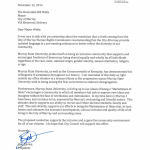The City Council chambers overflowed with citizens and Murray State students Thursday night when the Murray City Council convened to discuss revisions affecting the LGBT community in the current Human Rights Ordinance.
More than 75 emails from concerned citizens were submitted to the Murray City Council in the 24 hours before the meeting regarding the revisions.
Members of the commission proposed adding sexual orientation and sexual identity as protected classes to the city’s ordinance, said Jody Cofer Randall, chair of the City of Murray Human Rights Commission.
“To say that’s all we are adding would be an oversimplification,” Cofer Randall said.
Under the proposed revisions it would be unlawful, based upon race, color, religion, natural origin, sex, age (over 40), gender identity, sexual orientation, familial status or physical disability of any type, to discriminate in employment, public accommodations or housing practices.
An illegal housing practice, called blockbusting, is prohibited in the current ordinance. Blockbusting refers to frightening homeowners into selling their homes at a lowered value because members of a particular race, religion or sexual orientation are moving into their neighborhood.
The Human Rights Ordinance does not include sexual orientation or sexual identity as classes protected against discrimination.
Although Randall planned to present the commissions recommended revisions, he decided to put it on hold due to the overwhelming negative response from the community.
Randall said he spent most of the night before trying to decide what to say at the meeting.
A draft of the revision came out a year ago, he said, but the commission did not approve. Since then Mayor Bill Wells, city attorney Warren Hopkins and city administrator Matt Mattingly have been working on the revisions. The Human Rights Commission unanimously recommended the revised draft should go forward Monday.
“The commission believes that everyone in Murray has the right to earn a living, put a roof over their family’s head, and eat at their favorite restaurant without being asked to leave due to their intrinsic human characteristics,” Cofer Randall said.
The Commission hopes to make revisions to the Human Rights Ordinance that was adopted by the city in the 1970s. Randall said the ordinance has since been updated three times, but only for technical changes, not substantive ones.
“We have a 44-year-old Human Rights Ordinance,” he said. “Human rights evolve. How we treat each other changes.”
City Council member Robert Billington said when an ordinance is put into effect, it starts with a firm line then boundaries are pushed, leading to more liberalization.
“I don’t have a problem with homosexuals, but I don’t support it,” he said. “I have to look at this from a long-term perspective.”
Jane Shoemaker, City Council member, said the Human Rights Commission has been studying the ordinance for at least three years, but community members said in their emails they did not know revisions were under consideration.
Randall said three faith leaders wrote letters opposing the new ordinance but said their arguments were not logical because of the religious protections that are included in the revisions.
“The proposed draft exempts religious organizations and religious affiliate organizations,” he said. “Three pages of the seven page draft are exemptions.”
Shoemaker said there was some confusion about the ordinance that the Human Rights Commission will work to clear up.
“There’s a lot of fear and misconception and we want to straighten this out,” she said.
The Human Rights Commission will meet at 6:30 p.m., Monday, Dec. 8 to review the community’s input. The commission encouraged the public to attend and offer their thoughts directly.
“We are hoping that all of the people who were here tonight will be able to attend so they can give their input and learn more about who we are and why we are doing this,” Shoemaker said.
It’s important to have this discussion in the community because Murray has a large Lesbian, Gay, Bisexual and Transgender community, she said.
Shoemaker estimated that Murray has a larger LGBT population than surrounding areas such as Mayfield, Ky., and Benton, Ky.
“We are proposing something that we think is fair particularly to the LGBT community who feel that their civil rights are not being protected,” Shoemaker said.
In a letter sent to Mayor Bill Wells Nov. 12 from Murray State President Bob Davies, Davies expressed his support for the revisions to the Human Rights Ordinance.
“Murray State prides itself on being an inclusive community that supports and encourages freedoms of democracy being shared equally and wholly by all individuals regardless of the race, color, national origin, gender identity, sexual orientation, religion or age,” Davies said. “Futhermore, Murray State, in living up to our ideals of being a ‘Marketplace of Ideas’ encourages a community in which all members feel safe to express new ideas and thoughts without fear of retribution and intimidation.”
Click to read Davies’ letter supporting the ordinance:
Story by Mari-Alice Jasper, Staff writer and Ben Manhanke, Staff writer
